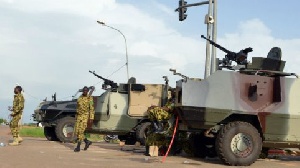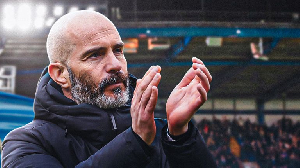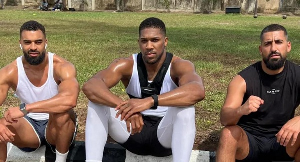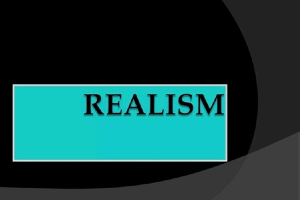The presidents of Senegal and Benin were on Friday due to arrive in Burkina Faso in a bid to mediate after a military coup on Thursday derailed the impoverished nation’s democratic transition.
“The goal behind this is to achieve a return to normal constitutional life, freeing the president and prime minister who are hostages, and the liberation of all the ministers,” Benin’s Foreign Minister Saliou Akadiri said on state-owned television ahead of the mediation talks.
The talks will be led by Senegal’s Macky Sall, who is the current chairman of the West African ECOWAS bloc, and Benin’s Thomas Boni Yayi.
The meeting comes just a day after former spy chief General Gilbert Diendéré seized power in a military coup, sparking violent protests in which at least three people were killed and more than 60 injured as members of the presidential guard fired warning shots to disperse the crowds.
The protesters have demanded the release of interim president Michel Kafando, Prime Minister Isaac Zida and two ministers who were detained by the presidential guard the day before, and that the October 11 elections go ahead as scheduled.
In an exclusive interview on Thursday, coup leader Diendéré told FRANCE 24 that Kafando and Zida would be freed, adding, “We will not hold them indefinitely."
Diendéré also told FRANCE 24 that he had had "no contact" with ex-president Blaise Compaoré during the takeover despite speculation over Compaoré's links to the coup's leaders. Diendéré once served as Compaoré's closest aide.
"We have the support of the army and the defence forces," Diendéré added shortly after the coup.
International condemnation
The coup drew condemnation from former colonial power France and the United States. United Nations Secretary-General Ban Ki-moon also demanded the release of detained officials and resumption of the transition.
The UN Security Council discussed the crisis and agreed a statement calling for the release of all officials detained in the “unconstitutional and forceful seizure of power”.
“The Security Council urged the perpetrators to restore constitutional order and return power to the civilian transitional authorities without delay,” the council statement said.
Diendéré, the junta leader who for three decades was Compaoré's shadowy chief military adviser, said the underlying cause of the military power grab was fear of instability after the transitional government barred Compaoré’s supporters from contesting the polls next month.
However, the country's National Reconciliation and Reforms Commission recommended Monday that the 1,300-man Presidential Security Regiment (RSP) headed by Diendéré, considered the landlocked country's best troops, be disbanded.
“There may be some kind of sanctions to face, but we will ask the international community to be understanding of Burkina Faso,” he told Reuters, promising to eventually organise elections.
Under Compaoré, Burkina emerged as a regional ally of France and the US against al Qaeda-linked militants. Burkina hosts some 200 special forces as part of France’s Barkhane regional anti-terrorist operation while Diendéré took part in US-sponsored regional counter-terrorism exercises in February.
Soldiers crush protests
In contrast to October’s uprising when thousands of protesters packed the streets led by civil society groups like Balai Citoyen (Citizen’s Broom), soldiers on Thursday acted quickly to scatter groups of demonstrators.
The coup leaders forced private radio and television stations off the air, and journalists on the streets were threatened or beaten.
Many streets in the city centre were deserted, and shops were closed as sporadic gunfire rang out in several districts of the capital. Independence Square, which was the heart of October’s uprising, was occupied by soldiers.
“People started to gather, then in front of us we saw a V8 (military vehicle) that drove directly into the crowd, and they started shooting, killing people,” said protester Bakary Zongo. “People started falling down.”
Some checkpoints along Burkina’s frontier with neighbouring Ivory Coast remained open despite the ordered closure of land and air borders by the coup leaders.
Elsewhere, protesters angered by the coup attacked the homes of well-known members of Compaoré’s Congress for Democracy and Progress (CDP).
Diendéré’s own home in the town of Yako was set on fire, according to several reports.
Operating behind the scenes
A towering figure, nearly 2 metres tall, Diendéré had long preferred to operate behind the scenes. Under Compaoré, he played a central role in negotiating the release of Western hostages seized by militant Islamist groups in the Sahel.
Although his wife is a member of the CDP leadership, Diendéré denied the coup was directly linked to the former president or his party. He said the junta would not interfere with investigations into Compaore, who is living in exile in Ivory Coast.
The head of Burkina Faso’s transitional parliament called on the rest of the armed forces to step in and halt a coup by “a small group” of military officers.
“The transition was put in place by the will of the people ... A small group of soldiers are not going to change that,” Moumina Cheriff Sy told Reuters, saying he was supposed to be the leader of the transition until Kafando was released.
The transition and October 11 vote was meant to mark a return to democracy a year after unrest toppled President Blaise Compaore when he tried to extend his 27-year rule. The uprising became a beacon for democratic aspirations in Africa at a time when long-term rulers from Rwanda to the Congo Republic were seeking to scrap presidential term limits.
Listen to the interview with coup leader Diendéré below.
General News of Friday, 18 September 2015
Source: France24













